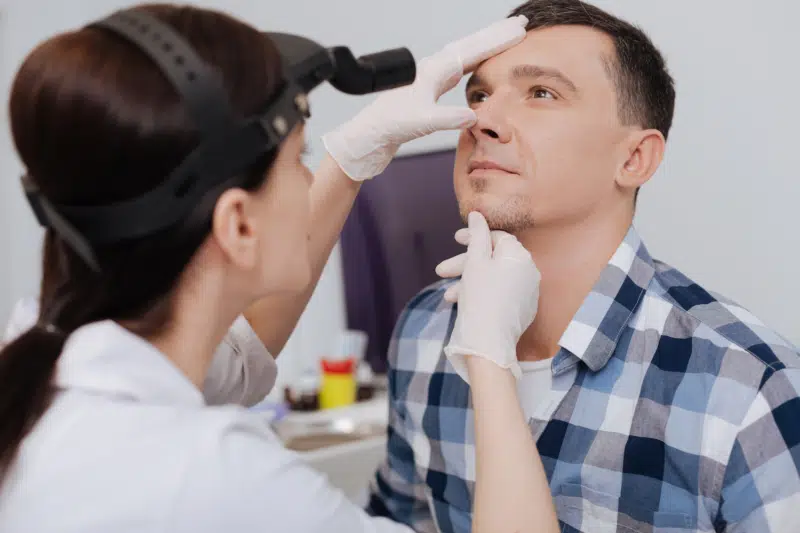
 go back
go back
Nasal Polyps
Nasal polyps form in the nose or sinuses and look like gray-white bubbles or teardrops. Unless the polyp is large and has grown down close to the opening of the nose, it is difficult to see polyps without the assistance of specialized medical equipment. Most polyps are present on both sides of the nose/sinuses, and if they’re not, further investigation to rule out cancer/pre-cancer growth should be done.
Make An AppointmentAbout 12% of all adults suffer from chronic rhinosinusitis, and 20% of those people have nasal polyps.
*According to the American Academy of Allergy, Asthma and Immunology.
Condition content was medically reviewed by an AllerVie Health physician in Oct. 2022.
About Nasal Polyps
Anyone can get nasal polyps, but they are more common in adults, people with cystic fibrosis, those with reactions to aspirin and non-steroidal anti-inflammatory drugs (NSAIDs, like ibuprofen), and people with Allergic Fungal Rhinosinusitis (AFRS).
There may be a hereditary link for nasal polyps, and those with asthma may also be at risk for having nasal polyps. What exactly causes nasal polyps is still unclear.
Not everyone has symptoms associated with nasal polyps. However, if you are experiencing breathing problems, a cold that just won’t go away, decreased sense of smell, or frequent sinus infections, you should seek advice from your provider or an allergy specialist. You may have nasal polyps.
Unfortunately, they are not completely harmless and may be linked to other conditions.
01
Causes
We still don’t know exactly what causes nasal polyps to develop and grow. In western populations, eosinophils, a type of allergy cell, appears to play a role, as does the bacteria Staphylococcus aureus.
Some researchers also believe nasal polyps occur because of specific characteristics of one’s immune system or the chemical make-up of one’s nose and sinus walls. However, more research is required.
02
Diagnosis
When you meet with one of our allergy specialists, they will ask you questions about your medical history and perform a physical exam. He/she may also look into your nose with a special tool called a rhinoscope, or nasal endoscope, which is a thin, flexible tube with a small camera at the end.
03
Treatment
Treatment for nasal polyps usually begins with a steroid nasal spray to shrink the nasal polyps. Your provider may also prescribe short-term oral corticosteroids, such as prednisone, but it should be used cautiously due to steroid side effects.
Saline sinus rinses and antileukotriene medications are also frequently recommended. For those who have aspirin or NSAID sensitivities, aspirin desensitization may also shrink the nasal polyps. Biologics are a class of medications more recently approved to treat nasal polyps.
Unfortunately, nasal polyps tend to come back, so you may need to keep using your polyp medications long-term and get checkups with a nasal endoscope every now and then.
Nasal Polyps Symptoms
You may have nasal polyps and not experience any symptoms, especially if the polyps are small. If you do have symptoms, they may include:
- Breathing through your mouth, which may present as snoring or sleep apnea
- Decreased or lost sense of smell and/or taste
- Facial pressure or pain, including pain in upper teeth
- Constant runny nose, or post-nasal drainage/drip
- Frequent asthma attacks if you have asthma
- Frequent sinus infections
- Nasal congestion or stuffy nose
Risk Factors
If you suffer from conditions that trigger inflammation of the nasal passages and sinuses, you may be at greater risk for developing nasal polyps. Conditions that are often associated with nasal polyps include:
Chronic Rhinosinusitis
Asthma
Aspirin Sensitivity
Allergic Fungal Rhinosinusitis (AFRS)
Cystic fibrosis
Eosinophilic Granulomatosis with Polyangiitis (EGPA)
Complications
Because nasal polyps can block your airflow and keep your nose and sinus from draining properly, left untreated they can cause complications that include:
- Chronic sinus infections
- Asthma flare-ups (for those who have asthma)
- Obstructive sleep apnea

When to See a Doctor for Nasal Polyps
If you are experiencing any of the symptoms associated with nasal polyps, contact one of our allergy specialists. They will be able to determine if your symptoms are caused by nasal polyps or another treatable condition. Nasal polyps are frequently co-managed by an allergist and an otolaryngologist, or Ear, Nose and Throat (ENT) specialist.
Consider asking your healthcare provider:
- How can I lessen the symptoms?
- Do I need medications or surgery or both?
- Should I restrict my activities?
- Do I need to see a specialist?
- Should I go to the emergency room for any symptoms?
Nasal Polyps Surgery
Depending on the severity of your nasal polyps, your provider may recommend surgery by an ENT specialist to remove the polyps. The type of surgery depends on the size of the polyp.
A polypectomy is an outpatient surgery done with a small suction device or a microdebrider that cuts and removes soft tissue, including the mucosa.
For larger polyps, your doctor can perform an endoscopic sinus surgery using a thin, flexible endoscope with a tiny camera and small tools on the end. Your doctor will guide the endoscope into your nostrils, find the polyps or other obstructions, and remove them. Your doctor may also enlarge the openings to your sinus cavities.
If the nasal polyps are occurring alongside chronic allergies, treating the allergies with allergy immunotherapy/allergy shots, may help with co-occurring symptoms.
Nasal Polyps FAQ
Are nasal polyps dangerous?
Nasal polyps alone are not considered a dangerous health condition. They can cause additional health conditions, such as sleep apnea and chronic sinusitis, which can then cause additional, more dangerous health issues.
Can nasal polyps be cancerous?
Nasal polyps are not cancerous, but they can be mistaken for growths that are cancerous or pre-cancerous. A medical provider needs to analyze your polyps to make a definitive diagnosis. There is no evidence that nasal polyps are life-threatening.
Can a nasal polyp fall out?
No, they must be surgically removed
Can you remove nasal polyps with tweezers?
No, they must be surgically removed as they are under the deep skin layers of the nose. Removal of nasal polyps can cause bleeding and puncture of the surrounding nasal passage and should be performed by a trained surgeon.
What is the long-term outlook after surgery for nasal polyps?
With surgical treatment, most symptoms get significantly better. However, if you’ve lost some sense of smell, it may never return. Even with surgery, nasal polyps may regrow in up to 30-40 percent of people after 6 months to a year.
